Mobile Menu

Lauryn Seering
Steven Pinker’s FFRF ad airs nationally on Colbert this week
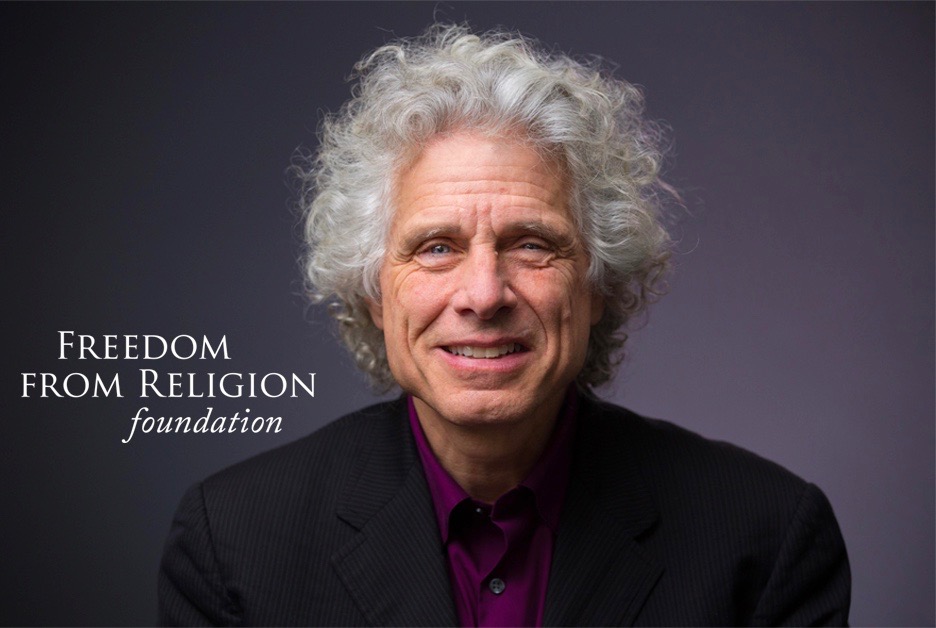
Steven Pinker’s ad endorsing the Freedom From Religion Foundation will air nationally today, Tuesday and Wednesday on CBS’ “The Late Show with Stephen Colbert,” 11:35 p.m. Eastern.
The distinguished Harvard professor and best-selling author urges viewers to join FFRF in its fight to prevent religion from creeping into U.S. government. Pinker has served as FFRF’s first honorary president since 2013. His newest book is Enlightenment Now: The Case for Reason, Science, Humanism and Progress.
The ad debuted in January in about 18 regional markets during “The Late Show.” In February, CBS agreed to run the ad nationally. This will be the first time an FFRF commercial has aired nationally on CBS since 2012. FFRF’s ad featuring John F. Kennedy’s famous remarks as a candidate endorsing the separation of state and church was shown then on “CBS News Sunday Morning” and the “Nightly News.” However, CBS has refused to broadcast FFRF’s commercial featuring Ron Reagan, in which he describes himself as “an unabashed atheist, not afraid of burning in hell.”
“The world has become a better place, as reason has been overcoming superstition and tribalism. But the values of the Enlightenment are under attack,” says Pinker in the current ad. “Please join me in supporting the Freedom From Religion Foundation to ensure that our government is driven not by religion, but by reason.”
The Freedom From Religion Foundation is flattered to receive the affirmation of such a leading global intellectual.
“We’re delighted and honored to have Steve’s endorsement fresh off the success of his powerful book, Enlightenment Now,” says FFRF Co-President Annie Laurie Gaylor. “We hope this campaign prompts secular Americans of all stripes to join FFRF at a critical time, as religious zealots are occupying our highest offices and courts.”
Pinker is one of the world’s premier intellects and cognitive psychologists, and serves as the Johnstone Family Professor of Psychology at Harvard University. He’s been named on the Time 100 list of the world’s “Most Influential People.” Among his other popular books are The Blank Slate, The Language Instinct and How the Mind Works.
With more than 31,000 members, FFRF, a 501(c)(3) nonprofit, works as a watchdog to protect the constitutional principle of the separation of state and church. For 40 years, FFRF has served as a leading voice for freethought in America. For more information, visit www.FFRF.org.
Freethought Radio -- March 21, 2019
Celebrate National Coming Out Day
Join FFRF’s Out of the Closet
Virtual Billboard Campaign

At the Freedom From Religion Foundation, we consider every day a “coming out day” for freethought! But this Saturday, March 23, has been declared an international “Coming Out Day” for atheists and other nonbelievers, and we’d like to invite you to take part in an amazing campaign. It is fun, creative and takes about a minute to participate. (See below.)
The nonreligious form a significant segment of the world population, including at least one in four U.S. citizens. But many Americans have never knowingly met a nonbeliever. You can dispel myths, educate and promote reason by adding your voice, face and message to FFRF’s “friendly neighborhood freethinker” campaign. Proclaim you’re an atheist, a skeptic, an agnostic, a humanist or freethinker — and why. It’s working for the gay rights movement. Now it’s time for atheists and agnostics to come out of our closet. Many faces make Enlightenment work.
Once your “virtual billboard” is approved by FFRF, you may post and tweet it. Our app even lets you use it as your Facebook or Twitter image or even as your Facebook and Twitter banners. If your “virtual billboard” is chosen as a staff “pick of the week,” FFRF will feature your billboard on Facebook and Twitter, and mail your prize — FFRF’s popular “Out of the Closet Atheist” cap (only U.S. residents eligible).
Declare and share your nonbelief on Saturday and on every day. If you’ve already participated, you can create a new message or look over the inspiring webpage after webpage of “out of the closet” contributions. Click for details: ffrf.org/out
P.S. We also offer a devilishly enjoyable digital billboard opportunity featuring the slogan “unabashed atheist [or appellation of your choice], not afraid of burning in hell.”


Scientific American Ad April Landing Page
 |
 |

The Freedom From Religion Foundation, incorporated in 1978, has an impressive track record of more than 40 years of diligent work to uphold the constitutional principle of separation between state and church. FFRF also works to educate the public on matters of nontheism, with more than 31,000 freethinking members: atheists, agnostics and skeptics of any pedigree. FFRF has won many lawsuits and thousands of state/church complaints disentangling religion from government. FFRF’s honorary president is the renowned Steven Pinker, most recently author of Enlightenment Now: The case for Reason, Science, Humanism and Progress. Dues and donations are deductible for income tax purposes. Please support our vital work by joining today. Or ask for more information and we’ll send you a complimentary copy of FFRF’s newspaper, Freethought Today, and a brochure documenting our many accomplishments.
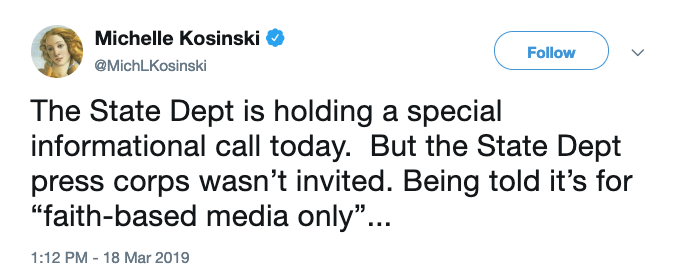
The Freedom From Religion Foundation, a national state/church watchdog, is calling attention to the troubling unconstitutional exclusion of nonreligious media from a State Department call today.
A member of the State Department press corps reported Monday that the State Department had limited a “special informational call” to “faith-based media,” excluding all members of secular media outlets. FFRF has promptly pointed out that such a prohibition violates both the Establishment Clause and the Freedom of the Press guarantee of the First Amendment to the U.S. Constitution in a letter to Secretary of State Mike Pompeo.
“Holding an informational media call that is open only to members of the media with your preferred religious viewpoint is anathema to your constitutional obligation to treat all Americans equally regardless of their religious affiliation,” writes FFRF Staff Attorney Ryan Jayne. “In addition, media that are not ‘faith-based’ have a right to be included in media calls or events that are open to their religious counterparts.”
FFRF has requested written assurances from the State Department that future media calls and events will not exclude nonreligious media or otherwise favor religion over nonreligion. FFRF has also filed a formal Freedom of Information Act request to obtain public records related to the event.
“The State Department’s favoritism towards ‘religiously-based’ media should be appalling to all Americans regardless of their religious beliefs,” FFRF Co-President Annie Laurie Gaylor comments. “Not only does it trample the core founding value of American democracy that is the freedom of the press, but it sends the message to the fast-growing number of nonreligious Americans that they are of secondary concern to their own government.”
The Freedom From Religion Foundation is a national nonprofit organization with more than 31,000 members and several chapters across the country, including members in every state. FFRF’s purposes are to protect the constitutional principle of separation between church and state, and to educate the public on matters relating to nontheism.
FFRF: remove bible verse from St. Louis courthouse
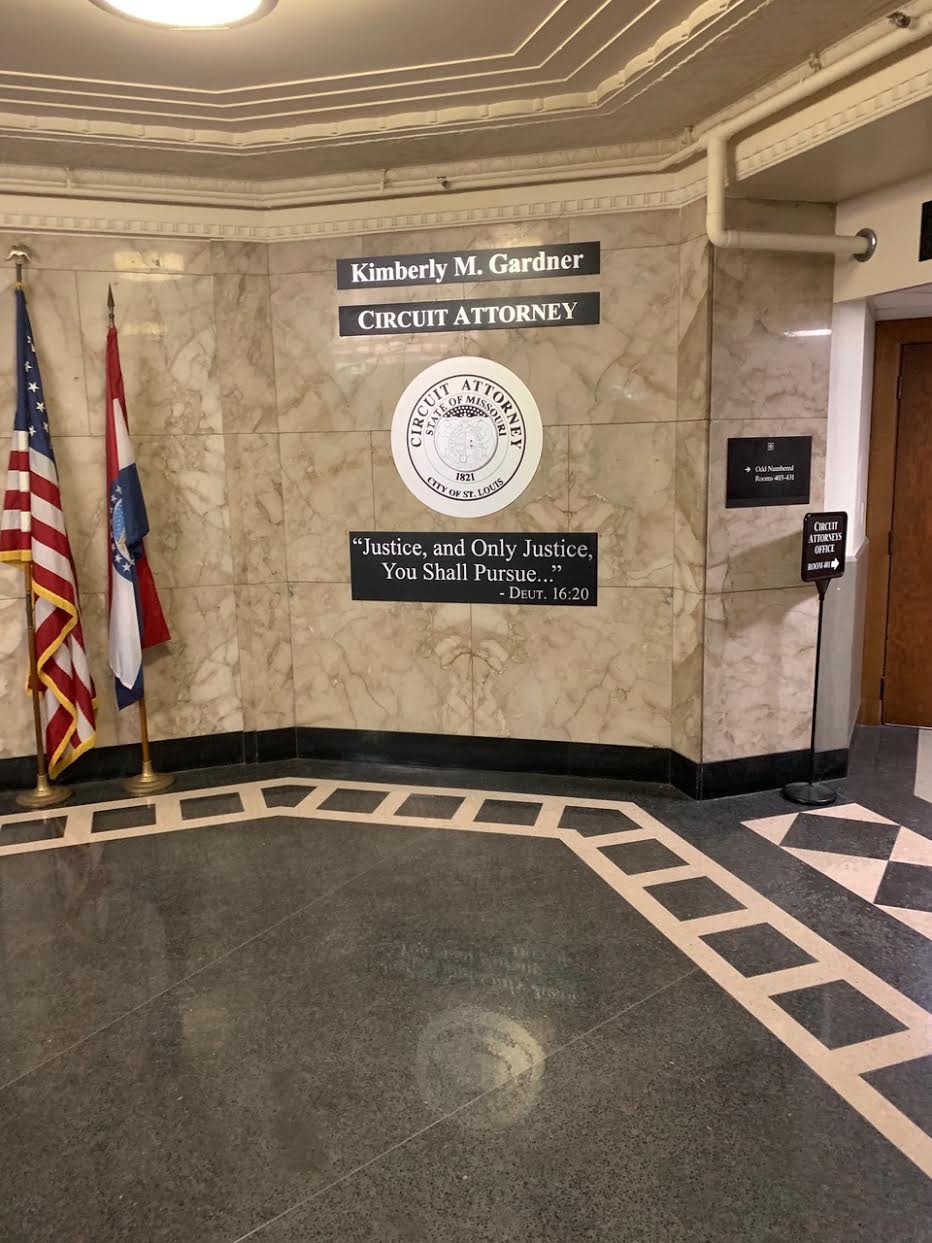
An Old Testament verse displayed at the St. Louis circuit attorney’s office must be immediately taken down, says the Freedom From Religion Foundation, a national state/church watchdog.
A concerned resident of St. Louis County informed FFRF that a bible verse is prominently displayed at Kimberly Gardner’s office in the Carnahan Courthouse. The verse is reportedly affixed to the wall directly outside of the office, right beneath plaques bearing Gardner’s name, title and the seal of the St. Louis circuit attorney. The verse reads: “Justice, and Only Justice, You Shall Pursue…” (Deuteronomy 16:20).
The Establishment Clause of the First Amendment prohibits government sponsorship of religious messages, FFRF reminds Gardner.
“The Supreme Court has said time and again that the ‘First Amendment mandates government neutrality between religion and religion, and between religion and nonreligion,’” FFRF Robert Ingersoll Legal Fellow Colin McNamara writes to Gardner.
Federal courts have also consistently upheld restrictions on religious displays on government property. The 9th U.S. Circuit Court of Appeals has stated that the “government has a greater interest in controlling what materials are posted on its property than it does in controlling the speech of the people who work for it.” The 5th Circuit has likewise held that religious displays on government property impermissibly endorse religion.
What’s also important to emphasize here, FFRF says, is that the circuit attorney’s office is charged with serving all citizens regardless of belief or nonbelief. A bible verse alienates the one in five St. Louisans who is nonreligious and expresses a preference for Judeo-Christian faith in a government building responsible for administering and upholding our laws.
Furthermore, references to Old Testament law are simply inappropriate for the top prosecutor in St. Louis to display. Those familiar with the Old Testament know that the Book of Deuteronomy primarily consists of Moses’ exhortations to his people to rigorously follow the biblical God’s many commandments. It is the strict adherence to those laws that this verse refers to as “justice.” In its full context, the Deuteronomy 16:20 verse reads: “Justice, and only justice, you shall pursue, so that you may live and occupy the land that the Lord your God is giving you.” This is immediately followed by a warning not to worship any other gods or else risk invoking Yahweh’s wrath. Prohibitions against the worship of any god but Yahweh are an incessant refrain throughout Deuteronomy, a proscription that is wholly incompatible with our secular Constitution. More alarmingly, Deuteronomy decrees that all nonbelievers, practitioners of other religions, and apostates must be exterminated with prejudice, and that it is the public’s duty to see that these infidels are executed. Deuteronomy goes so far as to order every follower of Yahweh to murder apostates, whether they be your own parent, child or dearest friend.
This theocratic notion of justice stands at odds with the enlightened principles embodied in our Bill of Rights — principles like due process, humane punishment and the absolute freedom of conscience, which the circuit attorney has sworn to defend. It would be appropriate, as well as constitutionally prudent, for the walls of the circuit attorney’s office to reflect a commitment to a more rational and progressive system of justice, FFRF exhorts. It asks for the Deuteronomy 16:20 verse to be yanked off at once.
“The display of such a verse in a circuit attorney’s office is inappropriate on several levels,” says FFRF Co-President Annie Laurie Gaylor. “We don’t need Old Testament notions of justice to be adorning official spaces.”
The Freedom From Religion Foundation is a national nonprofit organization with more than 31,000 members across the country, including in Missouri. Its purposes are to protect the constitutional separation between state and church, and to educate the public on the topic of nontheism.
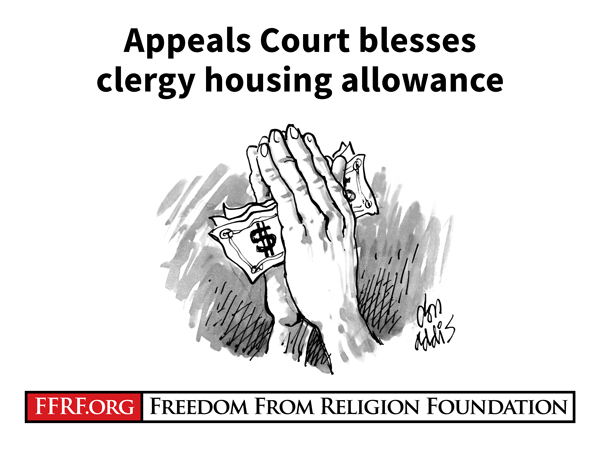
A three-judge panel of the 7th U.S. Circuit Court of Appeals in Chicago today ruled against the Freedom From Religion Foundation’s historic challenge of a housing allowance in the tax code that uniquely privileges clergy.
FFRF had won a favorable ruling by a federal judge in 2017, who found unconstitutional 26 U.S.C. § 107(2). That provision in the tax code allows “ministers of the gospel” to exclude from gross income any “housing allowance” paid by their church.
The 7th Circuit panel, in a decision written by Judge Michael B. Brennan, found that the plaintiffs and FFRF had proved their standing, and have properly alleged a ‘concrete, dollars-and-cents injury.’“ Nevertheless, it ruled 3-0 against FFRF on the merits. The other judges are William Bauer and Daniel Manion.
A billion-dollar tax benefit to “ministers of the gospel,” in the minds of these three judges, “has a secular legislative purpose, its principal effect is neither to endorse nor to inhibit religion, and it does not cause excessive government entanglement.”
Reacts FFRF Co-President Annie Laurie Gaylor, one of the plaintiffs: “The housing allowance is so clearly a handout to churches and clergy, and it so clearly shows preferential treatment and discriminating in favor of ministers.”
The provision also clearly discriminates against nontheistic leaders who are similarly situated to clergy, Gaylor added, especially since the sponsor of the 1954 law challenged by FFRF, Rep. Peter Mack, argued that ministers should be rewarded with a clergy allowance for “carrying on such a courageous fight against this [a godless and anti-religious world movement].”
The clergy allowance is not a tax deduction, but an exemption — allowing housing allowances paid as part of clergy salary to be subtracted from taxable income. The congressional Joint Committee on Taxation has reported that the exemption amounts to $700 million a year in lost revenue. Religion News Service calculated the allowance increases the take-home pay of some pastors by up to 10 percent. Churches benefit, since tax-free salaries lower their overhead. Christianity Today found that 84 percent of senior pastors receive a housing allowance of $20,000 to $38,000 in added (but not reported) compensation to their base salary.
The co-plaintiffs with Gaylor were FFRF Co-President Dan Barker and Ian Gaylor, representing the estate of President Emerita Anne Nicol Gaylor. FFRF had designated a housing allowance for the trio, and on that basis they sued the IRS. FFRF’s complaint alleged that the allowance “directly benefits ministers and churches, most significantly by lowering a minister’s tax burden, while discriminating against the individual plaintiffs, who as the leaders of a nonreligious organization opposed to governmental endorsements of religion are denied the same benefit.”
This is the second time FFRF had come before the 7th Circuit asking it to find the tax code provision unconstitutional. In 2013, U.S. District Judge Barbara Crabb ruled in FFRF’s favor in its original challenge. Crabb’s finding sent “shockwaves through the religious community,” according to the Evangelical Council for Financial Accountability, which bitterly fought the ruling, along with just about every religious denomination in the country.
In November 2014, the 7th Circuit threw out FFRF’s first victory, saying the trio would need to prove their standing to sue by seeking and being denied a refund of their housing allowance. Accordingly, they sought the refunds and when denied, went back to court.
While Crabb ruled that “the plain language of the statute, its legislative history and its operation in practice all demonstrate a preference for ministers over secular employees,” the appeals court panel disagreed, applying what they called “the historic significance test.”
Wrote Brennan: “FFRF claims §107(2) renders unto God that which is Caesar’s. But this tax provision falls into the play between the joints of the Free Exercise Clause and the Establishment Clause: neither commanded by the former, nor proscribed by latter. We conclude §107(2) is constitutional. The judgment of the district court is reversed.”
This shows that ministers are not entitled to the benefit, therefore Congress could repeal it. “It’s an injustice not just to us, but to taxpayers who have to pay more than their share, because clergy pay less,” Gaylor says.
Nor did the appeals court decision address the problem that the financial benefits apply even wealthy ministers. “The manner in which our housing allowance has been used borders on clergy malpractice,” William Thornton, a Georgia pastor and blogger, told Forbes magazine in 2013. “A growing subset of ministers who are very highly paid and who live in multi-million dollar mansions are able to exclude hundreds of thousands of dollars from income taxation.”
Clergy may use the housing allowance not just for rent or mortgage, but for home improvements, including maintenance, home improvements and repairs, dishwashers, cable TV and phone fees, paint, towels, bedding, home décor, even personal computers and bank fees. They may exempt from taxable income up to the fair market rental value of their home, particularly helping well-heeled pastors. The subsidy extends to churches, which can pay clergy less, as tax-free salaries go further.
The defendants were Steve Mnuchin, U.S. secretary of the treasury, and Charles Rettig, current IRS commissioner. The case also had religious intervenors as defendants.
The case was filed on behalf of FFRF by litigator Richard L. Bolton. Tax law professor Adam Chodorow, who was counsel of record in a friend of the court brief on behalf of FFRF, joined Bolton in the oral arguments. Gaylor et al v. U.S. Treasury has case number 3:16-cv-00215.
FFRF condemns New Zealand terror strikes
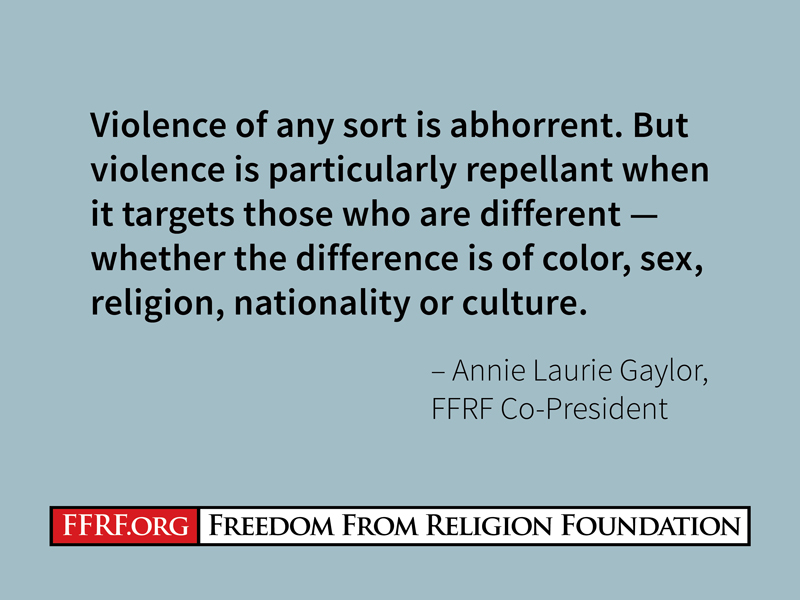
Several shooters went into two mosques in Christchurch (one of New Zealand’s largest cities) and opened fire, killing indiscriminately. Nearly 50 are dead — a number expected to rise — and many more injured in the worst terrorist attack New Zealand has suffered.
It goes without saying that no one should be targeted because of their religion or irreligion. The Freedom From Religion Foundation condemns all hate crimes and deplores gun violence, which, unfortunately, occurs on a daily basis in the United States.
Four people have been arrested. Some outlets report that the shooters livestreamed the massacre and that one shooter (whom we will not name) wrote a ranting, anti-immigrant, anti-Muslim manifesto rambling about “white genocide.” As the Washington Post notes, the manifesto’s “title, ‘The Great Replacement,’ echoes the rallying cry of, among others, the torch-bearing protesters who marched in Charlottesville in 2017.”
We know this attack, almost certainly religiously motivated, will be met with more calls for “thoughts and prayers,” but prayers cannot stop mass shootings. As a Guardian writer opined: “Your thoughts and prayers will not save our lives.” Or, as FFRF’s Director of Strategic Response Andrew Seidel has written, “Don’t pray. Do.”
Violence of any sort is abhorrent. But violence is particularly repellant when it targets those who are different — whether the difference is of color, sex, religion, nationality or culture. That’s what makes the Christchurch killings especially repugnant and frightening.

An answer can be found in the sentence doled out this week by the Islamic Republic of Iran to a human rights attorney there: 148 lashes and 33 years imprisonment. What were the “crimes” committed by Nasrin Soutoudeh that required such a draconian response? They included defending abused children and women arrested for not wearing headscarves, and protesting the execution of juveniles.
Forty years after the creation of the Islamic Republic, we see the theocratic chokehold continue, despite what looked like hopeful protests in the streets last year. The young woman waving her white headscarf on a pole during a demonstration seized international headlines and imaginations. Yet look at the fate of Soutoudeh, a 55-year-old mother of two teenagers, for working for basic human rights.
In December 1979, when the Grand Ayatollah Ruhollah Khomeini became “supreme leader” of the newly born Islamic Republic, FFRF released an ironic bumper sticker: “Iran: One Nation Under God.”
We thought there could not be a better cautionary tale about the dangers of mixing God and government than Iran’s Islamic revolution. Khomeini banned Western culture and denied Iranian women equal rights — forcing them into headscarves, terrorized the population with his religious police and theocratic courts, and began issuing “fatwas” resulting in the detention, torture and execution of tens of thousands of dissidents and “transgressors.”
The barbarity of Soutodeh’s sentence is rightly causing an international outcry, including by the U.S. State Department, which condemns it as “beyond barbaric.”
But, as New York Times columnist Nicholas Kristof notes today, the State Department has been silent about a similar miscarriage of justice this week in Saudi Arabia. Loujain al-Hathloul, 29, a leader of the Saudi women’s rights movement, went on trial yesterday, after being imprisoned and tortured. Her "crimes"? Communicating with human rights organizations and criticizing the Saudi “guardianship” policy, which subjugates women.
As Kristof writes: “If you care about human rights only in countries you despise, you don’t actually care about human rights.”
And if you care about human rights, you also cannot ignore the complexities of theopolitics — and the nefarious role of the United States in planting the seeds of the Islamic Republic of Iran. The CIA-orchestrated overthrow of Iran’s democratically elected prime minister, Mohammad Mossadegh, in 1953, and the U.S. backing of the Shah, Mohammad Reza Shah Pahlavi, ultimately put in motion the backlash that became the Iranian revolution.
Nevertheless, the brutal sentence of this champion of human rights in Iran shows exactly why secular government is essential to ensure women’s rights, human rights and freedom of thought. This is why we at FFRF do what we do.
FFRF: End U.S. aid to Saudi ‘holy war’ in Yemen

The Senate has rightly voted to end U.S. involvement in Saudi Arabia's war on Yemen, and the House should follow suit.
The conflict is being fought largely along sectarian religious lines, and U.S. participation in the warfare is exacerbating these fissures. Saudi Arabia is a fundamentalist Sunni Muslim theocracy combating a Shiite minority in Yemen, the Houthis (an ugly faction itself motivated largely by religion), as part of a larger crusade against Shiite Iran.
Innocent Yemenis are being crushed in this religious warfare. The war has triggered a devastating humanitarian crisis, with numerous civilians killed and starvation and cholera rampant among the country’s nearly 30 million citizens.
The U.S. shares intelligence and sells arms to Saudi Arabia and its coalition partners so that they can continue to wage this holy war. This coalition has been responsible for a large portion of the suffering in Yemen.
“As the leader of the coalition that began military operations against Houthi forces in Yemen on March 26, 2015, Saudi Arabia has committed numerous violations of international humanitarian law,” Human Rights Watch stated in a 2018 report. “As of August, at least 6,592 civilians had been killed and 10,471 wounded, according to the Office of the United Nations High Commissioner for Human Rights (OHCHR), although the actual civilian casualty count is likely much higher. The majority of these casualties were a result of coalition air strikes.”
Following the brutal murder of U.S. resident and Washington Post journalist Jamal Khashoggi, the Senate previously voted last December to end U.S. support for the Saudi war in Yemen. Then-Speaker of the House Paul Ryan refused to let the resolution come up for a House vote last session. But earlier this year, the House voted to end military assistance for Saudi Arabia’s war.
Unfortunately, President Trump is expected to veto any resolution against this conflict. The conflict in Yemen will continue to exact its human toll — until the United States and its ally Saudi Arabia can be persuaded to see reason.
Photo via Shutterstock by anasalhajj
FFRF decries religious coercion in Mich. school district

The Hamilton Community Schools system is engaging in appallingly unconstitutional behavior that is grievously harming its students, asserts the Freedom From Religion Foundation.
Multiple students and parents have contacted the state/church watchdog to convey how various religious practices at a local high school are causing embarrassment or ostracization.
Hamilton High School regularly holds choir performances in several area churches. The school’s Women’s Chorale and Honors Choir instructor Holly Israels has reportedly integrated students directly into the Sunday worship services at these churches, essentially taking the place of the church’s own gospel choir at a number of events throughout the year. After performing the opening hymns, students are directed to sit in the front row of pews for the duration of the roughly hour-long sermon before singing the closing hymns.
A student complainant conveyed to FFRF extreme discomfort during these sermons, especially when the content strays into “derogatory messages regarding people in the LGBT community.” FFRF’s complainant further reports that Israels “fully participates in all worship activities during the sermon.”
The student has been placed in a no-win situation. “Either we have to sit through these sermons or leave and be ostracized,” the student told FFRF. The student has ended up doing both on different occasions.
“I have felt humiliated,” the student says. “The teacher doesn’t understand the situation I’m in.”
To make matters worse, these performances are for-credit and mandatory, and a choir student who objects to coerced participation in a religious service may lose points off their final grade or face other disciplinary action. FFRF heard from one student who elected to simply drop the class rather than be forced to choose between a good grade or freedom of conscience.
In effect, Hamilton Community Schools has repeatedly compelled choir students into participating in a worship service, FFRF contends.
“Nothing more needs to be proven to establish that the district has violated the First Amendment,” FFRF Legal Fellow Colin McNamara writes to Superintendent David Tebo. “The Supreme Court has repeatedly held that public schools may not compel or coerce students into participating in any religious observance.”
FFRF also notes that Hamilton High School allows a youth pastor to enter the school during the school day. Pastor Scott Davis of Haven Reformed Church has reportedly been seen talking with students during the lunch period “a couple times every week.” Davis does not limit himself to conversing with students who are members of his church, but also sits down with other students and initiates conversation. He has entered classrooms on occasion, as well, asking students in one particular instance if they would go on the “Colorado Challenge,” a youth field trip organized by his church.
It is inappropriate and unconstitutional for the district to offer pastors unique access to befriend and proselytize students on school property, FFRF reminds Hamilton Community Schools.
“The district cannot allow its schools to be used as recruiting grounds for churches during the school day,” McNamara writes. “It is well settled that the Establishment Clause bars the ‘utilization of the tax-established and tax-supported public school system to aid religious groups to spread their faith,’” to quote the landmark McCollum v. Board of Education case.
Allowing church representatives regular, or even one-time, access to proselytize and recruit students for religious activities on school grounds is a violation of the Establishment Clause. Courts have upheld injunctions against schools for their complacency in such situations.
The misbehavior of the school district doesn’t end here. Its Board of Education begins its public meetings with prayer, with school board members reportedly leading these prayers themselves.
Prayer at school board meetings violates the Establishment Clause, FFRF informs school officials. Numerous federal courts of appeal have held that this practice violates the Establishment Clause of the First Amendment — including the 6th U.S. Circuit Court of Appeals, which has jurisdiction over Michigan. In the most recent case striking down a school board’s prayer practice, the 9th U.S. Circuit Court of Appeals, in a California lawsuit brought about by FFRF, reaffirmed that school board prayer “implicates the concerns with mimicry and coercive pressure that have led us to ‘be … particularly vigilant in monitoring compliance with the Establishment Clause,’” quoting in part from a U.S. Supreme Court decision.
FFRF has told the school district that it must cease holding school-sponsored performances in churches; it should not allow youth pastors to enter school grounds during the school day; and it must at once stop having prayer at its school board meetings.
“The violations occurring in Hamilton Community Schools are horrendous — and harmful to the student population,” says FFRF Co-President Annie Laurie Gaylor. “School officials must come to grips with the fact that they’re serving a public school system, not Christian schools.”
The Freedom From Religion Foundation is a national nonprofit organization with more than 31,000 members across the country, including nearly 800 members in Michigan. Its purposes are to protect the constitutional separation between state and church, and to educate the public on matters relating to nontheism.
FFRF supports the Equality Act for LGBTQ Americans
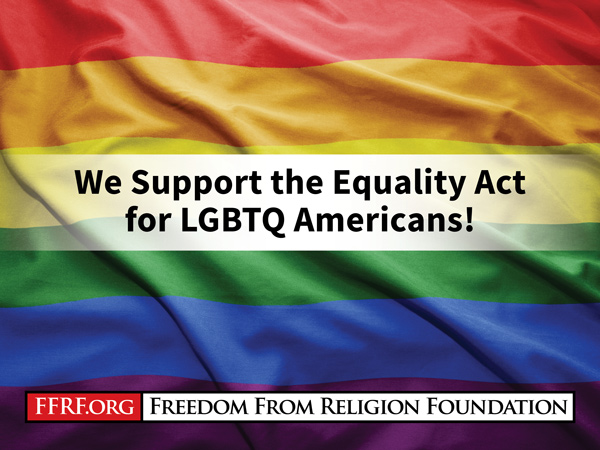
Discrimination against LGBTQ Americans — often rooted in bigoted religious beliefs — is still rife in this country. Today, the Equality Act was again proposed in both houses of Congress to protect them from this hatefulness.
The Civil Rights Act prohibits discrimination against particular classes of people, including bigotry based on their religion, race, and sex, but, sadly, not the prejudice they face on the basis of their sexual orientation or gender identity. This means it’s up to states, counties and cities to decide whether or not to specifically safeguard LGBTQ individuals as a class under their civil rights acts and ordinances. Some states, like Colorado, site of the “gay wedding cake” case, protect LGBTQ citizens, but about 20 states do not. The Equality Act will correct this omission.
“Civil liberties should not be dependent on the state you live in, or be subject to the tyranny of religious dogma,” says FFRF Co-President Annie Laurie Gaylor. “In a nation where our Constitution guarantees equal protection, and ‘Equal justice under the law’ is etched on the building housing our Supreme Court, it is simply wrong that LGBTQ individuals have rights in some cities, counties or states, but none in others.”
The Equality Act modernizes federal civil rights laws, banning discrimination based on “race, color, religion, sex, sexual orientation, gender identity, national origin, age, or disability” in a number of areas, including education, employment, housing, public accommodations, federal programs, and more.
“For too long, religion has imposed its Bronze Age immorality on public accommodations and civil rights laws,” argues FFRF Co-President Dan Barker, “it’s time to protect all Americans, whatever slander the bible may contain about them.”
While the House is almost certain to vote on the bill, its chances of seeing a vote in the Senate are less clear. What is clear is that the only organized opposition to the Equality Act is religious in nature, which is why FFRF works so hard to ensure that religious doctrine is not inscribed in U.S. civil laws or social policy.
